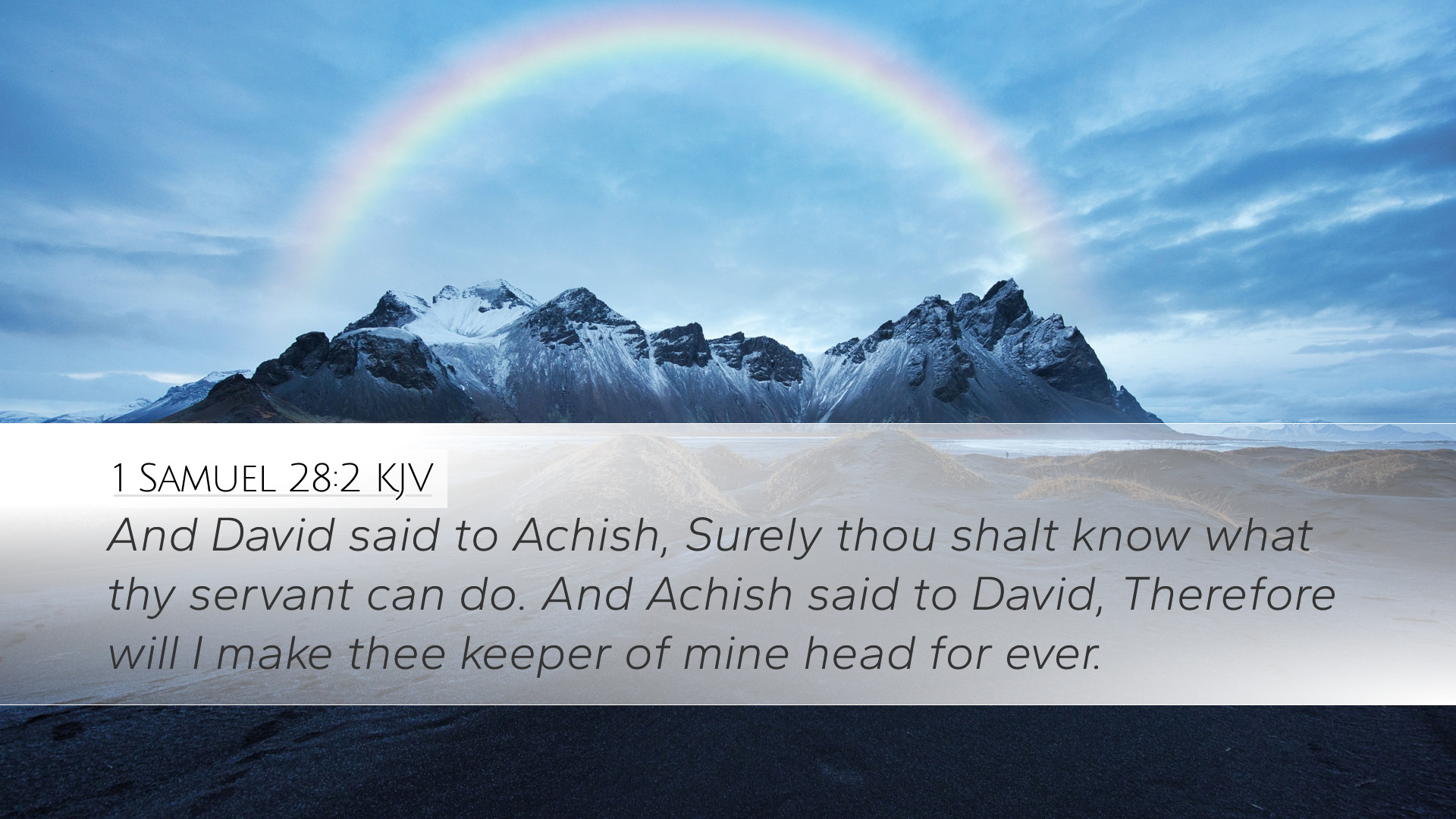Commentary on 1 Samuel 28:2
Verse: "And David said to Achish, ‘If you will make a written agreement with me, give me a place to live in among the towns of the country. Then I will serve you.’ And Achish replied, ‘You will be my bodyguard for life.’”
Contextual Background
The chapter takes place during a critical time in David's life, as he seeks refuge from Saul, the king of Israel. This verse is pivotal as it shows David's increasing dependence on Achish, the king of Gath, and highlights the complexity of his situation as he straddles the line between being an Israelite and living among the Philistines.
The Characters Involved
- David: The anointed future king of Israel who is currently a fugitive.
- Achish: The Philistine king of Gath who offers David protection.
Theological Insights
This verse prompts several theological reflections pertinent for pastors and theologians:
-
Divine Providence:
David's alliance with the Philistines raises questions about God's providence in the life of His chosen. Matthew Henry notes that God often brings His people into difficult situations to display His faithfulness.
-
Human Alliances:
David's request to Achish for a place of safety may be seen as a lack of faith. Adam Clarke comments on this, highlighting how believers sometimes turn to worldly solutions in times of distress rather than trusting in God’s plan.
-
Leadership and Service:
David's offer of service to Achish illustrates the delicate balance of leadership and servitude. It reflects the reality that even future leaders must navigate complex relationships for survival and the eventual fulfillment of God’s promises.
Commentary from Matthew Henry
Henry emphasizes the moral conflict David faces in aligning with the Philistines. He suggests that this partnership signals a departure from faithfulness to God’s covenant. Henry describes that despite David's genuine intentions, this alliance could lead to moral confusion and compromise.
Henry also notes that the text suggests a progressive hardening of David’s heart, as his circumstances lead him further away from reliance on God's will. David’s willingness to serve an enemy king for personal security highlights a thematic tension between divine dependence and human wisdom.
Commentary from Adam Clarke
Clarke elaborates on David’s rationale for seeking refuge with Achish, suggesting that in dire times, people often resort to what appears convenient rather than spiritually discerning. He cautions that this dependence on worldly rulers might distract one from God’s guidance and reinforce a spirit of compromise.
Moreover, Clarke interprets David’s situation as a cautionary tale about the need for believers to remain steadfast in faith, underscoring that true refuge lies in God, not earthly kings.
Commentary from Albert Barnes
Barnes reflects on the broader implications of David’s actions within the context of 1 Samuel. He points out that David's willingness to become Achish's bodyguard exemplifies the desperate lengths to which believers might go during trials. Barnes asserts that while David's actions may provide temporary relief, they risk leading to a deeper entanglement with the world.
Barnes also emphasizes that true fidelity to God should remain paramount, warning that even under duress, believers must seek God’s guidance in every decision, as reliance on human alliances can lead to spiritual downfall.
Practical Applications
For pastors, students, and scholars, this verse offers substantial ground for reflection and application:
-
Trust in God:
Encouraging congregations to develop a deeper trust in God's provision and timing, even in challenging circumstances.
-
Spiritual Discernment:
Promoting discernment in seeking help and alliances in tumultuous times, ensuring these decisions are aligned with God's will.
-
Leadership Lessons:
Discussing the intricacies of leadership, especially how leaders should not compromise their values for the sake of safety or popularity.
Conclusion
1 Samuel 28:2 encapsulates a moment of desperation in David's life while also prompting a deeper examination of trust, alliances, and divine providence. By scrutinizing David's actions and their implications, we are reminded of the necessity of relying fully on God, even amidst our darkest trials.


